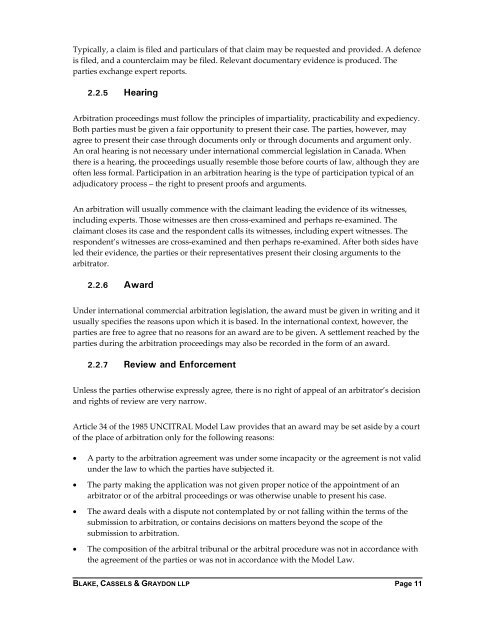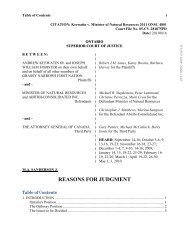Litigation and Dispute Resolution Guide
Litigation and Dispute Resolution Guide
Litigation and Dispute Resolution Guide
You also want an ePaper? Increase the reach of your titles
YUMPU automatically turns print PDFs into web optimized ePapers that Google loves.
Typically, a claim is filed <strong>and</strong> particulars of that claim may be requested <strong>and</strong> provided. A defenceis filed, <strong>and</strong> a counterclaim may be filed. Relevant documentary evidence is produced. Theparties exchange expert reports.2.2.5 HearingArbitration proceedings must follow the principles of impartiality, practicability <strong>and</strong> expediency.Both parties must be given a fair opportunity to present their case. The parties, however, mayagree to present their case through documents only or through documents <strong>and</strong> argument only.An oral hearing is not necessary under international commercial legislation in Canada. Whenthere is a hearing, the proceedings usually resemble those before courts of law, although they areoften less formal. Participation in an arbitration hearing is the type of participation typical of anadjudicatory process – the right to present proofs <strong>and</strong> arguments.An arbitration will usually commence with the claimant leading the evidence of its witnesses,including experts. Those witnesses are then cross-examined <strong>and</strong> perhaps re-examined. Theclaimant closes its case <strong>and</strong> the respondent calls its witnesses, including expert witnesses. Therespondent’s witnesses are cross-examined <strong>and</strong> then perhaps re-examined. After both sides haveled their evidence, the parties or their representatives present their closing arguments to thearbitrator.2.2.6 AwardUnder international commercial arbitration legislation, the award must be given in writing <strong>and</strong> itusually specifies the reasons upon which it is based. In the international context, however, theparties are free to agree that no reasons for an award are to be given. A settlement reached by theparties during the arbitration proceedings may also be recorded in the form of an award.2.2.7 Review <strong>and</strong> EnforcementUnless the parties otherwise expressly agree, there is no right of appeal of an arbitrator’s decision<strong>and</strong> rights of review are very narrow.Article 34 of the 1985 UNCITRAL Model Law provides that an award may be set aside by a courtof the place of arbitration only for the following reasons:• A party to the arbitration agreement was under some incapacity or the agreement is not validunder the law to which the parties have subjected it.• The party making the application was not given proper notice of the appointment of anarbitrator or of the arbitral proceedings or was otherwise unable to present his case.• The award deals with a dispute not contemplated by or not falling within the terms of thesubmission to arbitration, or contains decisions on matters beyond the scope of thesubmission to arbitration.• The composition of the arbitral tribunal or the arbitral procedure was not in accordance withthe agreement of the parties or was not in accordance with the Model Law.BLAKE, CASSELS & GRAYDON LLP Page 11
















